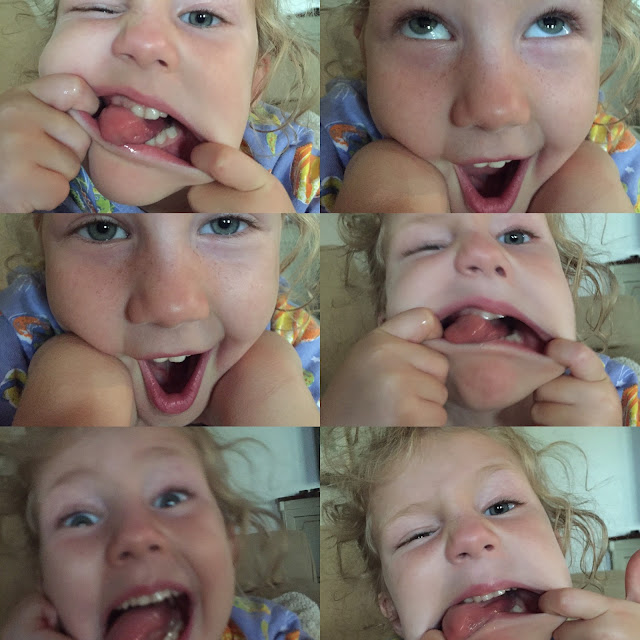Lost Dogs, Metaphors, and Life
 |
| Naomi on a silly day. |
Zoe
We lost Life.
The gate was left open.
We all took out
and wandered the neighborhood.
The girls held their mother’s hand,
walked the pavement in their velcro tennis shoes,
cried out through the chain linked fences,
Zoe! Zoe! Zoe!
Where are you Zoe?
Pain rained down her cheeks---
Pain rained down her cheeks---
grief, on the face of a child.
Zoe! Zoe! Zoe!
How she longed for life
to lick her salty tears
with that sandpaper tongue.
Where had Life gone?
The lost lives unaware,
enslaved to her true nature,
padding along, on the trail of a calico cat,
sniffing the fragrance of lampposts.
In hope, we believe that
wanderers will go home
when they get thirsty—the
first step it seems,
to being found.
These are the bones of a poem that has been simmering in me since we rolled up the windows and drove home from Annie’s house last Friday morning. I’ve been thinking recently about how God uses metaphors to teach us deeper things. He uses metaphors in the Bible in abundance and He uses them in daily life if we are paying attention to what is happening around us.
Annie scared me to death when she called on Friday morning. I heard the panic in her voice and my stomach knotted before she told me why she called. She needed help and asked me to come quick. Zoe had disappeared. Naomi had left the gate open and Annie wasn’t sure how long the dog had been lost. She needed help to find her so Jeff and I jumped in his truck and drove over.
We drove up and down the streets south of Moore. Annie called, said a lady had told her she had seen her over there. It was a good ways from the house and I was hoping she was wrong. We turned down toward a day care center thinking Zoe might be trying to make friends with some of the kids playing outside. That’s when we saw Annie walking up the street holding Naomi’s hand. Olivia was running along beside them weaving on and off the curb. It was hot; their faces were flushed and they were sweating. Naomi’s eyes were swollen from crying; guilt was weighing heavy on her.
They crawled up into the truck and buckled in. Annie was between them. They all called for Zoe out the back windows. Olivia echoed Annie in words and in pitch. Naomi called out too through her tears. We rolled along hollering and looking to see if she might dart out somewhere from between fences and old houses or cars sitting in driveways. Annie wanted to go back to the house to get her car so we could cover more ground.
Naomi was losing hope after walking all that way. Annie assured her that Zoe was smart and could find her way home. I wasn’t so sure, but I prayed Annie’s confidence was truth. I prayed too because God cares about lost dogs and little girl’s hearts. He knows the pain of loss. It’s one of his specialties—mending lost hearts. The three of them quit hollering when we turned up the street toward the red brick house they call home. As we came up the small grade of the hill, I saw Zoe come loping through the yard with her tongue hanging out. Her eyes were hidden behind a wad of black fuzzy hair. Liv grabbed her up and held her. Zoe thinks Liv is a dog.
Zoe, the word, in the Greek language, means life.
We found life in the front yard.
I couldn’t work it into the bones of the poem—at least not yet— but I’m wondering if there’s a bigger lesson for me about how I need to be more concerned for the lost, to feel grief for those who are far from the garden gate and the God who loves them, the One who is calling out to them, Life! Life! “Come all who are thirsty and drink, come to the waters.” Come home. You are lost but you can be found.
This event (what others might consider as a trivial drama concerning a dog) seemed significant to me as far as metaphors go. As we drove away relieved, I felt like God was telling me to remember the lost, to grieve for those who are far from him. Christians in these times seem to be mad at the lost, angry that people are acting out of their sin nature---like we all have. Why do I not grieve like I once did for those who are lost? Why do I not holler out the windows calling to them, introducing them to Life? Why are Christians hollering accusations out the windows and driving off? Wouldn't it be better to call to them, not to accuse them but to scoop them up and hold them? Is this my responsibility? Is it up to me? Are they not thirsty for something they can only find if they go home?
I think it is up to me... and it’s not up to me—a paradox that I sit with today.
I’m feeling a bit thirsty myself, but I know there is a Fountain. I think I'll have a drink and I'm hoping to have somebody who is thirsty to join me.
Comments
Post a Comment